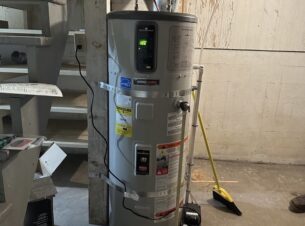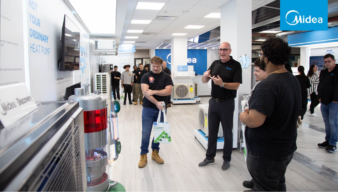ECM stands for Electronically Commutated Motor, they’ve been around in the USA for close to 10 years but are really just starting to gain some serious traction. What are they? They are pumps with permanent magnets that are electronically controlled and usually variable speed, they also convert the incoming AC current to DC. Why is all that important? It uses much less electrical energy and makes the pump speed completely variable.
Most existing small wet rotor circulator pumps are permanent split capacitor designs commonly called PSC motors and work just fine in most cases, with a couple of shortcomings, they use a fair amount of power,about 90 watts in most cases and are usually single speed or have three manually selected speeds that when selected converts the “3 speed” pump into a single speed which may or most likely not be the right speed anyway.

Why switch to ECM pumps? What are the benefits to the contractor and the customer? Number one for both is the reduced electrical consumption with an ECM pump. Anywhere from 50-75 % reduction in power consumption. Pretty substantial savings on a percentage basis, but how much is that in dollars? The run hours vary nationwide of course but are generally between 1800-3000 hours in the Continental USA.
Locally, in the New York area the number is 2000 hours and we pay about 23 cents Kwh or about $37 year to operate a PSC circulator. Half of that is an $18.50 savings per year, not a lot by itself but when considering the incremental cost to upgrade to an ECM, not a bad return on investment at all, about 45 times better than a money market account! It gets sweeter though, the 45 watts consumption of an ECM pump is at full speed and these are variable speed pumps.
How do they vary speeds? Some are Delta T pumps and vary speed based on supply and return temperatures to maintain a constant Delta T, usually 20 degrees in most systems. These pumps provide a benefit way beyond the electrical savings. How many systems run at the theoretical 20 degree Delta T? Very, very few, usually due to over pumping, the circulator is just too big and the flow rate too high, which lowers Delta T and increases boiler cycling. The reduction in boiler cycling will yield savings far beyond the electrical cost savings.
The other common style is Delta P pumps, these maintain a constant pressure by varying the speed. In response to increased or decreased resistance to flow. On a zone pump application, the Delta P pump will never change speeds, the system head never changes. However on a TRV or zone valve system resistance to flow will vary as valves open and shut and the pump will change speed to maintain a constant pressure. The variable nature of these pumps adds up to 25% to the electrical savings over a conventional PSC pump.
Should every new pump be an ECM pump? Probably most, but not all. It may not make economic sense in a zone pump system on rarely used zones, there aren’t enough run hours to justify the increased cost or in areas with very low cost electrical costs. The formula is,
(Run Hours) x (Watt Reduction) x (Cost per Watt) = Annual Savings
Watts are Kw divided by 1000 !
What’s in it for the contractor to reduce consumers electrical consumption? Put yourself in the customers shoes, would you like to do business with a contractor who is forward looking and concerned about the consumers best interest,striving to install and maintain the most modern, comfortable and efficient systems possible or a company that is happy with doing things the way they were always done with initial cost the only consideration?
Fuels costs vary widely but electrical costs are much more inelastic and are very slow to change making electrical bills stubbornly high while fossil fuel costs have come down from their highs quite a bit at least for now. Electrical costs will remain an issue of importance to consumers, why not be the guy who is offering the circulator equivalent of the LED bulb instead of the incandescent bulb guy?
 Robert C. O’Brien is the owner of Technical Heating Co. LLC in Mt. Sinai, NY.
Robert C. O’Brien is the owner of Technical Heating Co. LLC in Mt. Sinai, NY.




Join the conversation: